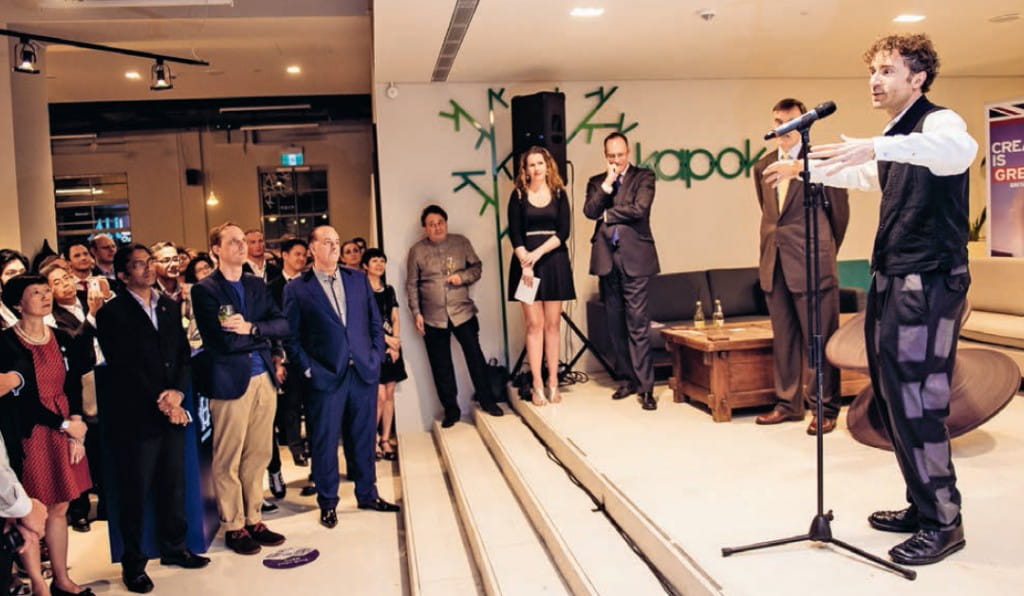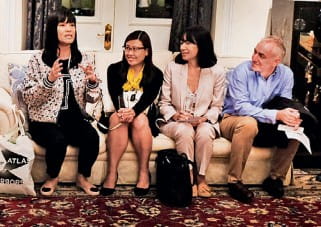Stories > Taking Cultural Stock
Taking Cultural Stock
Sarah Meisch Lionetto, British Council Singapore’s director of arts and creative industries, examines life in the city and its growing inclusive arts scene.
BY DESIREE KOH

"Inside Heatherwick Studio" premiered at the National Design Centre as part of the GREAT British Week, with an opening address by innovator Thomas Heatherwick.
n a November evening at the British High Commissioner’s official residence in Singapore, five artists take their bows in the main lobby, each having performed a piece putting their respective impairments, from blindness to autism, in the spotlight.
Taking in the audience’s warm applause in the wings was Sarah Meisch Lionetto, British Council Singapore’s director of arts and creative industries. The South African has been credited for transposing the UK’s social model of inclusive arts to the local cultural landscape.
She may have spent more than a decade living in Singapore, but Lionetto is able to, without hesitation, recall her reasons for moving to the island state from Aix-en-Provence, France, where she was pursuing her PhD in Literature.
“Multiculturalism has always been a part of my life, and I grew up in a household that was fluent in German, French, Italian, English and Spanish,” she shares.
“The delights of foreign words and the alternative worlds they conjure led me to study languages, as I was eager to expand the possibilities of connecting with people from other countries.”
DELVING IN DIFFERENCES
Curious about cultural particularities and how they seemed to be mirrored in language, Lionetto was drawn to Singapore, having heard of its diversity and multilingualism. And she was not disappointed.
“I’ve loved discovering Singlish expressions such as ‘shiok’ and ‘kiasu’, which are so richly descriptive and don’t fully translate without knowledge of local culture,” she says.
“I recently realised just how familiar I am with local culture when I laughed spontaneously and heartily throughout two local theatre productions – I therefore passed the ultimate cultural literacy litmus test, which is the grasp of local humour!”
Local vernacular aside, the widely travelled professional did initially have concerns over whether Singapore – which she considered a young country with a nascent arts scene – would offer her the dynamism she sought. However, she shares that she has, over the years, been thrilled to discover an abundance of rich cultural activity that has developed exponentially. Notably, this has resulted in a shift towards a more inclusive arts scene.
“Within a short period of time, Singapore has cultivated a thriving history in arts education, with the School of the Arts opening in 2008,” she shares. “In 2018, the Esplanade set key milestones with performances for the Singapore debut of The Curious Incident of the Dog in the Night-time, a play designed for people on the autism spectrum and those with sensory, communication and learning difficulties. The country has also hosted important lectures by experts on accessibility to arts for all.”
Lionetto is optimistic about the future of the arts in Singapore, marked by what she views as a blossoming enthusiasm to engage more deeply with the creative world, and to cultivate fuller access to the medium.
|
Through her work at the British Council, Lionetto has been able to interact and work with a diverse group of artists in sharing ideas and developing skills. |
Although life in Singapore has its obvious contrasts to what she was used to in Europe – from the climate to the language – she insists that she has adjusted to the Little Red Dot swimmingly. This she attributes to the hospitality displayed by the Singaporeans, which she has been well-acquainted with. “I’ve been impressed by how Singaporeans regale attendees at cultural events with scrumptious spreads – much more than the tea and biscuits I’m accustomed to,” she says. But beyond just the abundance of food, she has warmed to the hospitality displayed by the Singaporeans. “There’s such a fantastic volunteer support team at the British Council, who accompany the guests round the clock,” she states. “The UK artistes we have hosted have been touched by their attentiveness.” Not surprisingly, her role at the British Council – the UK’s largest cultural relations and arts organisation – has focused on people for the last six years. Lionetto is thankful for Singapore’s inherently multicultural environment, which allows her to work seamlessly with a diversity of partners and artists in sharing ideas and developing skills. |
“I appreciate how we can have engagement without language barriers or over-sensitivity to historical references here in Singapore. What stands out to me is the power of art to preserve collective memory,” she explains.
“I Realised Just How Familiar I Am With Local Culture When I Laughed Spontaneously Throughout Two Local Theatre Productions – I Therefore Passed The Ultimate Cultural Literacy Litmus Test, Which Is The Grasp Of Local Humour!”
Sarah Meisch Lionetto, Director Of Arts And Creative Industries, British Council Singapore
ARTS FOR ALL
If anything, Lionetto’s body of work in Singapore bears testament to the ability of the arts to transcend boundaries.
Apart from signing a Memorandum of Understanding (MoU) with Singapore’s National Arts Council to map out a framework to develop a more inclusive cultural sector in the country, the British Council also supported And Suddenly I Disappear… The Singapore ‘d’ Monologues in 2018. The performance, which held its sold-out world premiere at the National Museum of Singapore, set an important precedent: the first multilingual, intercultural, disability-led theatre project created between the UK and Singapore.
“It gave a liberating creative voice to groups that previously had none, and changed perceptions of the genre, prompting deep self-reflection on the role of the individual and society in exacerbating disability,” explains Lionetto.
Working closely with Singaporeans to boost inclusive arts, she says, has been an enjoyable experience, as she admires her counterparts’ courtesy, efficiency and attention to detail. She’s also happy to see how far the country has come in terms of changing attitudes towards disability.
“Before, only charity and medical models prevailed in exacerbating disability issues in Singapore, as opposed to a more social model that looks to the role society and its attitudes can play. It’s rewarding seeing efforts reflected in a growing creative case for disability, which acknowledges inclusivity as central to the vitality and dynamism of the arts, instead of more traditional perceptions of disability art as second-rate,” she says.
However, she states that there is still more to be done in terms of nurturing a more multi-faceted arts scene. “To further grow the arts scene, it would also be important for Singaporean artists to gain access to more international opportunities and for their success to be appreciated both locally and abroad,” she explains.
“It’s Rewarding Seeing Efforts Reflected In A Growing Creative Case For Disability, Which Acknowledges Inclusivity As Central To The Dynamism Of The Arts... To Further Grow The Arts Scene, It Would Also Be Important For Singaporean Artists To Gain Access To More International Opportunities And For Their Success To Be Appreciated Both Locally And Abroad.”
To that end, Lionetto is geared up to implement the British Council’s new thought leadership and access programmes, which will explore ageing and disability.
In the year ahead, she is also looking forward to the fruits of the recently inked inaugural MoU between the British Council and DesignSingapore Council to foster collaboration between Singapore and the UK through mutual support of design activities.
With such a bustling schedule, how does the working mother unwind from the hive of activity revolving around her?
“I love visiting the Singapore Botanic Gardens in the late afternoons. It’s so blissful being surrounded by lovely trees and plants – a relaxing antidote to the rapid pace of the city,” she shares. “I also enjoy taking my son to the National Gallery Singapore. Hopefully, the arts will become embedded in his life, like it has in mine.”

